Organisational Behaviour: Analysing Team Dynamics at Next Plc Report
VerifiedAdded on 2023/06/11
|17
|5922
|461
Report
AI Summary
This report provides an analysis of organisational behaviour within Next Plc, focusing on the influence of culture, politics, and power on individual and team performance. It evaluates content and process theories of motivation, examining how motivational techniques facilitate goal achievement. The characteristics of effective versus ineffective teams are explained, along with an analysis of relevant team development theories. Furthermore, the report explores various concepts and philosophies of organisational behaviour in a business context, justifying their impact on behaviour, and critically evaluates the relevance of team development theories in the context of organisational behaviour concepts and philosophies that influence workplace behaviour. The report concludes with recommendations for fostering a positive and productive work environment at Next Plc.
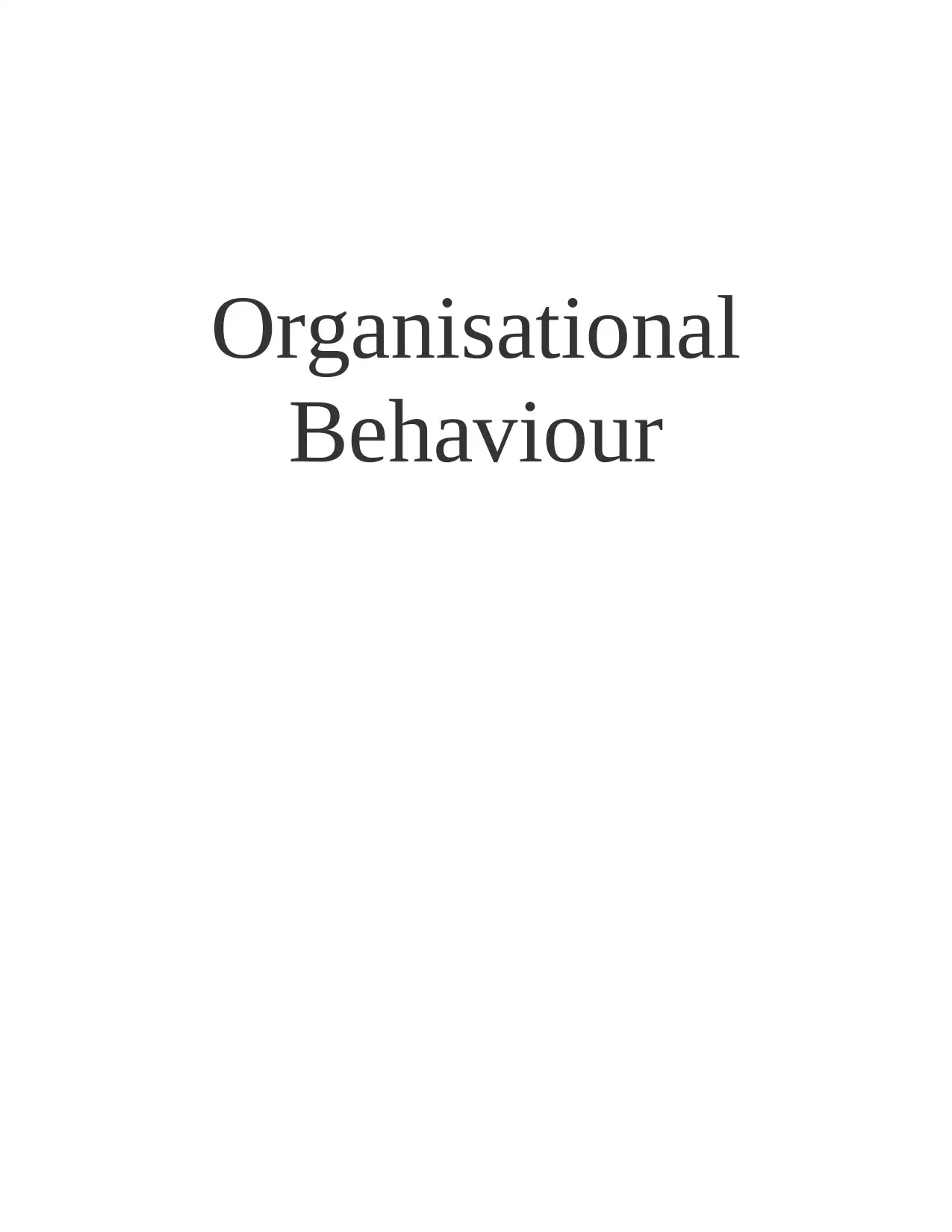
Organisational
Behaviour
Behaviour
Paraphrase This Document
Need a fresh take? Get an instant paraphrase of this document with our AI Paraphraser
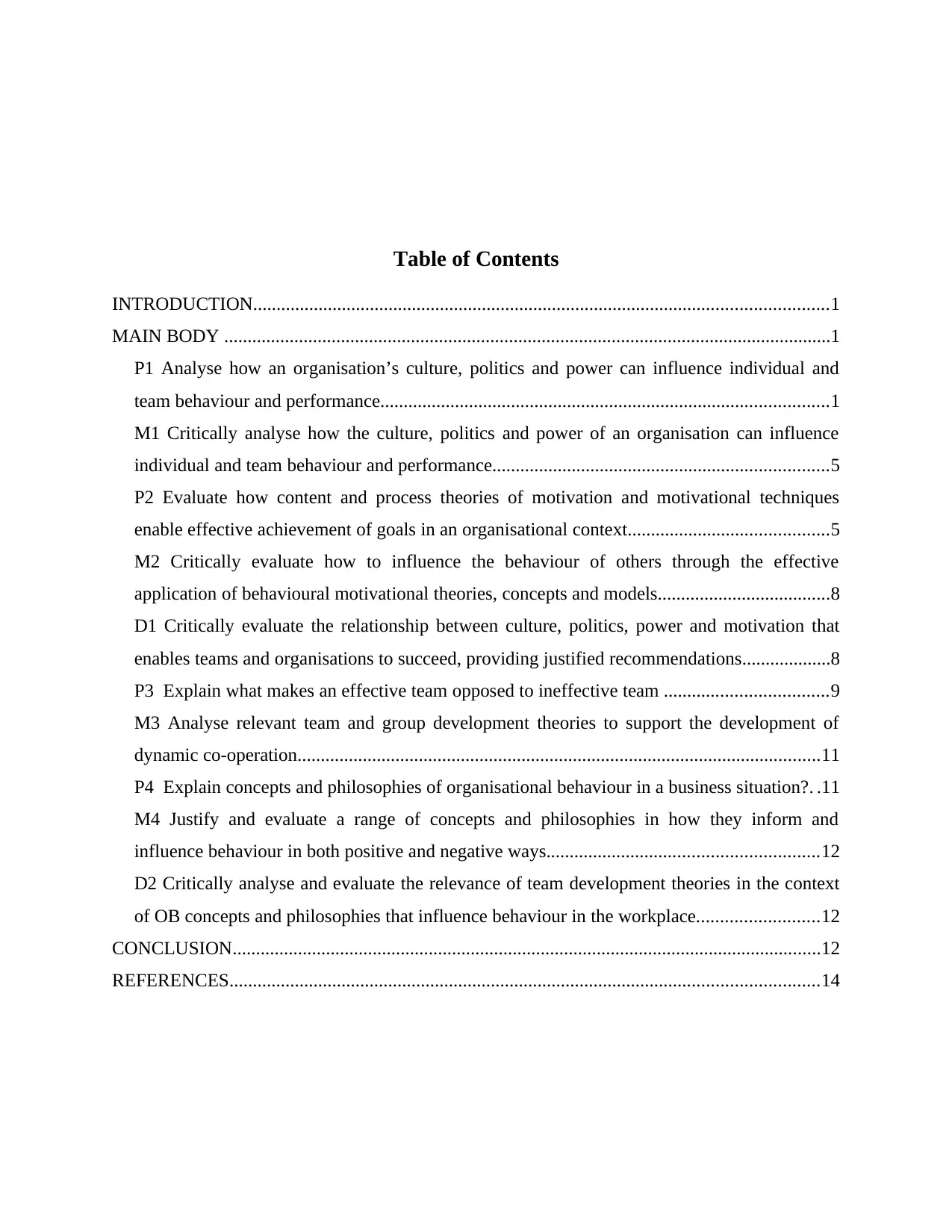
Table of Contents
INTRODUCTION...........................................................................................................................1
MAIN BODY ..................................................................................................................................1
P1 Analyse how an organisation’s culture, politics and power can influence individual and
team behaviour and performance................................................................................................1
M1 Critically analyse how the culture, politics and power of an organisation can influence
individual and team behaviour and performance........................................................................5
P2 Evaluate how content and process theories of motivation and motivational techniques
enable effective achievement of goals in an organisational context...........................................5
M2 Critically evaluate how to influence the behaviour of others through the effective
application of behavioural motivational theories, concepts and models.....................................8
D1 Critically evaluate the relationship between culture, politics, power and motivation that
enables teams and organisations to succeed, providing justified recommendations...................8
P3 Explain what makes an effective team opposed to ineffective team ...................................9
M3 Analyse relevant team and group development theories to support the development of
dynamic co-operation................................................................................................................11
P4 Explain concepts and philosophies of organisational behaviour in a business situation?. .11
M4 Justify and evaluate a range of concepts and philosophies in how they inform and
influence behaviour in both positive and negative ways..........................................................12
D2 Critically analyse and evaluate the relevance of team development theories in the context
of OB concepts and philosophies that influence behaviour in the workplace..........................12
CONCLUSION..............................................................................................................................12
REFERENCES..............................................................................................................................14
INTRODUCTION...........................................................................................................................1
MAIN BODY ..................................................................................................................................1
P1 Analyse how an organisation’s culture, politics and power can influence individual and
team behaviour and performance................................................................................................1
M1 Critically analyse how the culture, politics and power of an organisation can influence
individual and team behaviour and performance........................................................................5
P2 Evaluate how content and process theories of motivation and motivational techniques
enable effective achievement of goals in an organisational context...........................................5
M2 Critically evaluate how to influence the behaviour of others through the effective
application of behavioural motivational theories, concepts and models.....................................8
D1 Critically evaluate the relationship between culture, politics, power and motivation that
enables teams and organisations to succeed, providing justified recommendations...................8
P3 Explain what makes an effective team opposed to ineffective team ...................................9
M3 Analyse relevant team and group development theories to support the development of
dynamic co-operation................................................................................................................11
P4 Explain concepts and philosophies of organisational behaviour in a business situation?. .11
M4 Justify and evaluate a range of concepts and philosophies in how they inform and
influence behaviour in both positive and negative ways..........................................................12
D2 Critically analyse and evaluate the relevance of team development theories in the context
of OB concepts and philosophies that influence behaviour in the workplace..........................12
CONCLUSION..............................................................................................................................12
REFERENCES..............................................................................................................................14
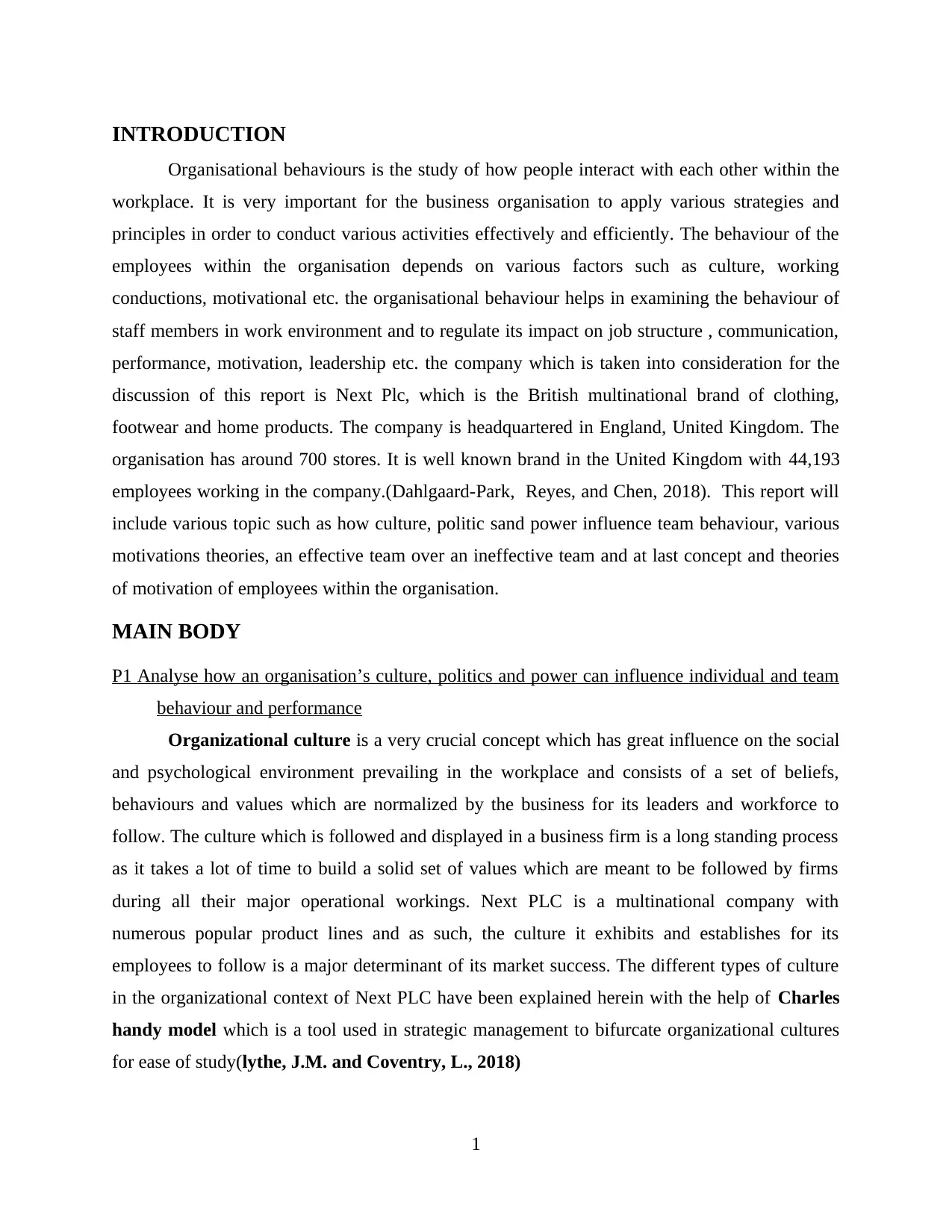
INTRODUCTION
Organisational behaviours is the study of how people interact with each other within the
workplace. It is very important for the business organisation to apply various strategies and
principles in order to conduct various activities effectively and efficiently. The behaviour of the
employees within the organisation depends on various factors such as culture, working
conductions, motivational etc. the organisational behaviour helps in examining the behaviour of
staff members in work environment and to regulate its impact on job structure , communication,
performance, motivation, leadership etc. the company which is taken into consideration for the
discussion of this report is Next Plc, which is the British multinational brand of clothing,
footwear and home products. The company is headquartered in England, United Kingdom. The
organisation has around 700 stores. It is well known brand in the United Kingdom with 44,193
employees working in the company.(Dahlgaard-Park, Reyes, and Chen, 2018). This report will
include various topic such as how culture, politic sand power influence team behaviour, various
motivations theories, an effective team over an ineffective team and at last concept and theories
of motivation of employees within the organisation.
MAIN BODY
P1 Analyse how an organisation’s culture, politics and power can influence individual and team
behaviour and performance
Organizational culture is a very crucial concept which has great influence on the social
and psychological environment prevailing in the workplace and consists of a set of beliefs,
behaviours and values which are normalized by the business for its leaders and workforce to
follow. The culture which is followed and displayed in a business firm is a long standing process
as it takes a lot of time to build a solid set of values which are meant to be followed by firms
during all their major operational workings. Next PLC is a multinational company with
numerous popular product lines and as such, the culture it exhibits and establishes for its
employees to follow is a major determinant of its market success. The different types of culture
in the organizational context of Next PLC have been explained herein with the help of Charles
handy model which is a tool used in strategic management to bifurcate organizational cultures
for ease of study(lythe, J.M. and Coventry, L., 2018)
1
Organisational behaviours is the study of how people interact with each other within the
workplace. It is very important for the business organisation to apply various strategies and
principles in order to conduct various activities effectively and efficiently. The behaviour of the
employees within the organisation depends on various factors such as culture, working
conductions, motivational etc. the organisational behaviour helps in examining the behaviour of
staff members in work environment and to regulate its impact on job structure , communication,
performance, motivation, leadership etc. the company which is taken into consideration for the
discussion of this report is Next Plc, which is the British multinational brand of clothing,
footwear and home products. The company is headquartered in England, United Kingdom. The
organisation has around 700 stores. It is well known brand in the United Kingdom with 44,193
employees working in the company.(Dahlgaard-Park, Reyes, and Chen, 2018). This report will
include various topic such as how culture, politic sand power influence team behaviour, various
motivations theories, an effective team over an ineffective team and at last concept and theories
of motivation of employees within the organisation.
MAIN BODY
P1 Analyse how an organisation’s culture, politics and power can influence individual and team
behaviour and performance
Organizational culture is a very crucial concept which has great influence on the social
and psychological environment prevailing in the workplace and consists of a set of beliefs,
behaviours and values which are normalized by the business for its leaders and workforce to
follow. The culture which is followed and displayed in a business firm is a long standing process
as it takes a lot of time to build a solid set of values which are meant to be followed by firms
during all their major operational workings. Next PLC is a multinational company with
numerous popular product lines and as such, the culture it exhibits and establishes for its
employees to follow is a major determinant of its market success. The different types of culture
in the organizational context of Next PLC have been explained herein with the help of Charles
handy model which is a tool used in strategic management to bifurcate organizational cultures
for ease of study(lythe, J.M. and Coventry, L., 2018)
1
⊘ This is a preview!⊘
Do you want full access?
Subscribe today to unlock all pages.

Trusted by 1+ million students worldwide
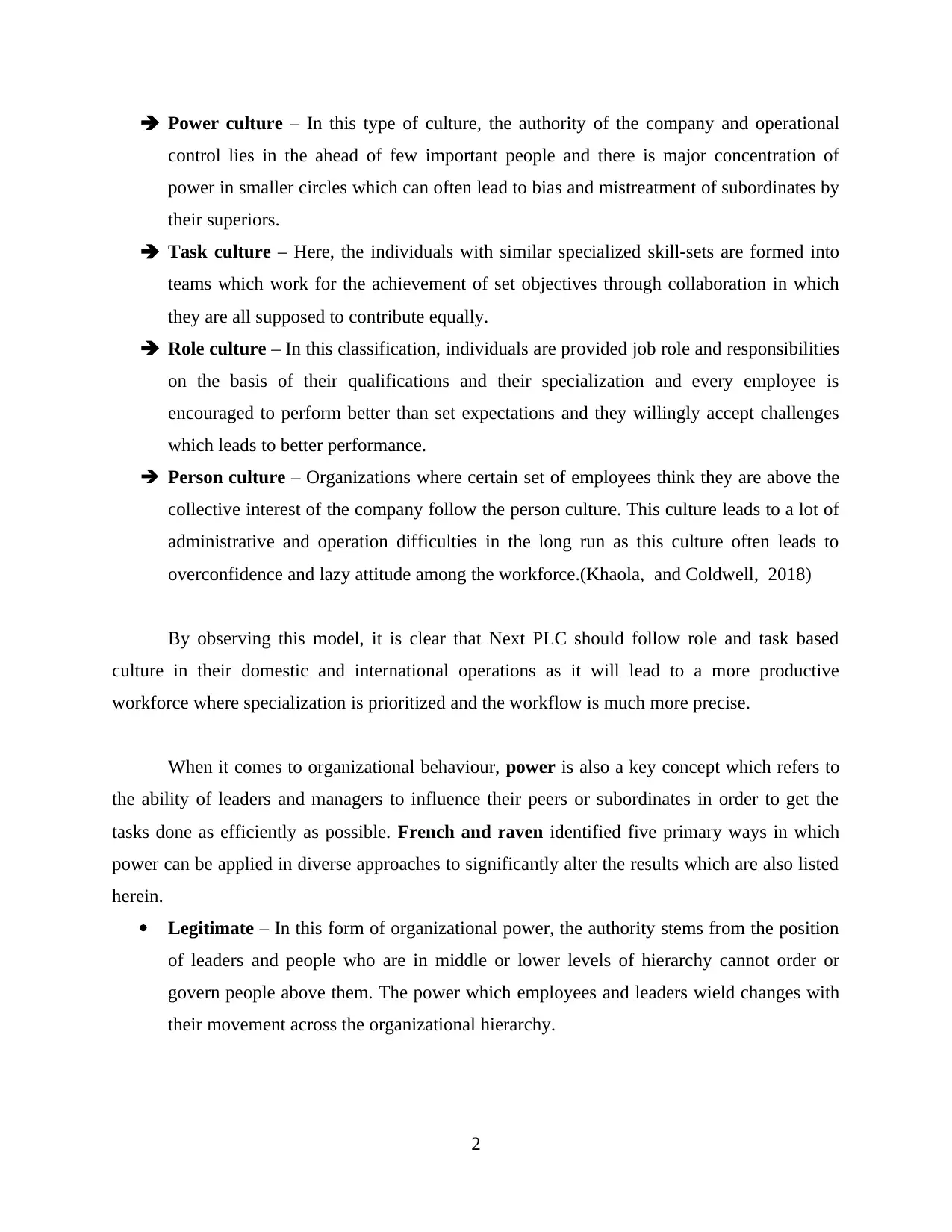
Power culture – In this type of culture, the authority of the company and operational
control lies in the ahead of few important people and there is major concentration of
power in smaller circles which can often lead to bias and mistreatment of subordinates by
their superiors.
Task culture – Here, the individuals with similar specialized skill-sets are formed into
teams which work for the achievement of set objectives through collaboration in which
they are all supposed to contribute equally.
Role culture – In this classification, individuals are provided job role and responsibilities
on the basis of their qualifications and their specialization and every employee is
encouraged to perform better than set expectations and they willingly accept challenges
which leads to better performance.
Person culture – Organizations where certain set of employees think they are above the
collective interest of the company follow the person culture. This culture leads to a lot of
administrative and operation difficulties in the long run as this culture often leads to
overconfidence and lazy attitude among the workforce.(Khaola, and Coldwell, 2018)
By observing this model, it is clear that Next PLC should follow role and task based
culture in their domestic and international operations as it will lead to a more productive
workforce where specialization is prioritized and the workflow is much more precise.
When it comes to organizational behaviour, power is also a key concept which refers to
the ability of leaders and managers to influence their peers or subordinates in order to get the
tasks done as efficiently as possible. French and raven identified five primary ways in which
power can be applied in diverse approaches to significantly alter the results which are also listed
herein.
Legitimate – In this form of organizational power, the authority stems from the position
of leaders and people who are in middle or lower levels of hierarchy cannot order or
govern people above them. The power which employees and leaders wield changes with
their movement across the organizational hierarchy.
2
control lies in the ahead of few important people and there is major concentration of
power in smaller circles which can often lead to bias and mistreatment of subordinates by
their superiors.
Task culture – Here, the individuals with similar specialized skill-sets are formed into
teams which work for the achievement of set objectives through collaboration in which
they are all supposed to contribute equally.
Role culture – In this classification, individuals are provided job role and responsibilities
on the basis of their qualifications and their specialization and every employee is
encouraged to perform better than set expectations and they willingly accept challenges
which leads to better performance.
Person culture – Organizations where certain set of employees think they are above the
collective interest of the company follow the person culture. This culture leads to a lot of
administrative and operation difficulties in the long run as this culture often leads to
overconfidence and lazy attitude among the workforce.(Khaola, and Coldwell, 2018)
By observing this model, it is clear that Next PLC should follow role and task based
culture in their domestic and international operations as it will lead to a more productive
workforce where specialization is prioritized and the workflow is much more precise.
When it comes to organizational behaviour, power is also a key concept which refers to
the ability of leaders and managers to influence their peers or subordinates in order to get the
tasks done as efficiently as possible. French and raven identified five primary ways in which
power can be applied in diverse approaches to significantly alter the results which are also listed
herein.
Legitimate – In this form of organizational power, the authority stems from the position
of leaders and people who are in middle or lower levels of hierarchy cannot order or
govern people above them. The power which employees and leaders wield changes with
their movement across the organizational hierarchy.
2
Paraphrase This Document
Need a fresh take? Get an instant paraphrase of this document with our AI Paraphraser
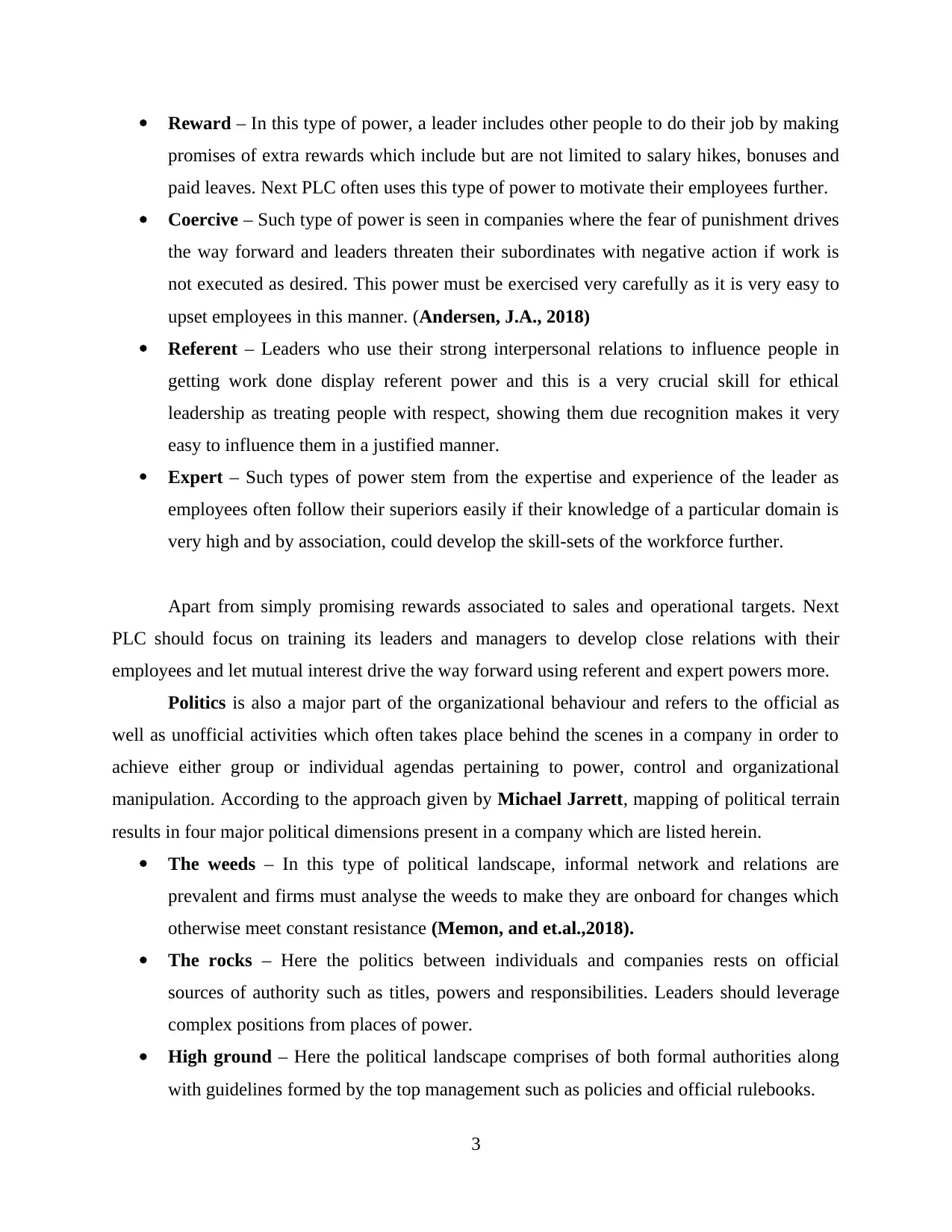
Reward – In this type of power, a leader includes other people to do their job by making
promises of extra rewards which include but are not limited to salary hikes, bonuses and
paid leaves. Next PLC often uses this type of power to motivate their employees further.
Coercive – Such type of power is seen in companies where the fear of punishment drives
the way forward and leaders threaten their subordinates with negative action if work is
not executed as desired. This power must be exercised very carefully as it is very easy to
upset employees in this manner. (Andersen, J.A., 2018)
Referent – Leaders who use their strong interpersonal relations to influence people in
getting work done display referent power and this is a very crucial skill for ethical
leadership as treating people with respect, showing them due recognition makes it very
easy to influence them in a justified manner.
Expert – Such types of power stem from the expertise and experience of the leader as
employees often follow their superiors easily if their knowledge of a particular domain is
very high and by association, could develop the skill-sets of the workforce further.
Apart from simply promising rewards associated to sales and operational targets. Next
PLC should focus on training its leaders and managers to develop close relations with their
employees and let mutual interest drive the way forward using referent and expert powers more.
Politics is also a major part of the organizational behaviour and refers to the official as
well as unofficial activities which often takes place behind the scenes in a company in order to
achieve either group or individual agendas pertaining to power, control and organizational
manipulation. According to the approach given by Michael Jarrett, mapping of political terrain
results in four major political dimensions present in a company which are listed herein.
The weeds – In this type of political landscape, informal network and relations are
prevalent and firms must analyse the weeds to make they are onboard for changes which
otherwise meet constant resistance (Memon, and et.al.,2018).
The rocks – Here the politics between individuals and companies rests on official
sources of authority such as titles, powers and responsibilities. Leaders should leverage
complex positions from places of power.
High ground – Here the political landscape comprises of both formal authorities along
with guidelines formed by the top management such as policies and official rulebooks.
3
promises of extra rewards which include but are not limited to salary hikes, bonuses and
paid leaves. Next PLC often uses this type of power to motivate their employees further.
Coercive – Such type of power is seen in companies where the fear of punishment drives
the way forward and leaders threaten their subordinates with negative action if work is
not executed as desired. This power must be exercised very carefully as it is very easy to
upset employees in this manner. (Andersen, J.A., 2018)
Referent – Leaders who use their strong interpersonal relations to influence people in
getting work done display referent power and this is a very crucial skill for ethical
leadership as treating people with respect, showing them due recognition makes it very
easy to influence them in a justified manner.
Expert – Such types of power stem from the expertise and experience of the leader as
employees often follow their superiors easily if their knowledge of a particular domain is
very high and by association, could develop the skill-sets of the workforce further.
Apart from simply promising rewards associated to sales and operational targets. Next
PLC should focus on training its leaders and managers to develop close relations with their
employees and let mutual interest drive the way forward using referent and expert powers more.
Politics is also a major part of the organizational behaviour and refers to the official as
well as unofficial activities which often takes place behind the scenes in a company in order to
achieve either group or individual agendas pertaining to power, control and organizational
manipulation. According to the approach given by Michael Jarrett, mapping of political terrain
results in four major political dimensions present in a company which are listed herein.
The weeds – In this type of political landscape, informal network and relations are
prevalent and firms must analyse the weeds to make they are onboard for changes which
otherwise meet constant resistance (Memon, and et.al.,2018).
The rocks – Here the politics between individuals and companies rests on official
sources of authority such as titles, powers and responsibilities. Leaders should leverage
complex positions from places of power.
High ground – Here the political landscape comprises of both formal authorities along
with guidelines formed by the top management such as policies and official rulebooks.
3
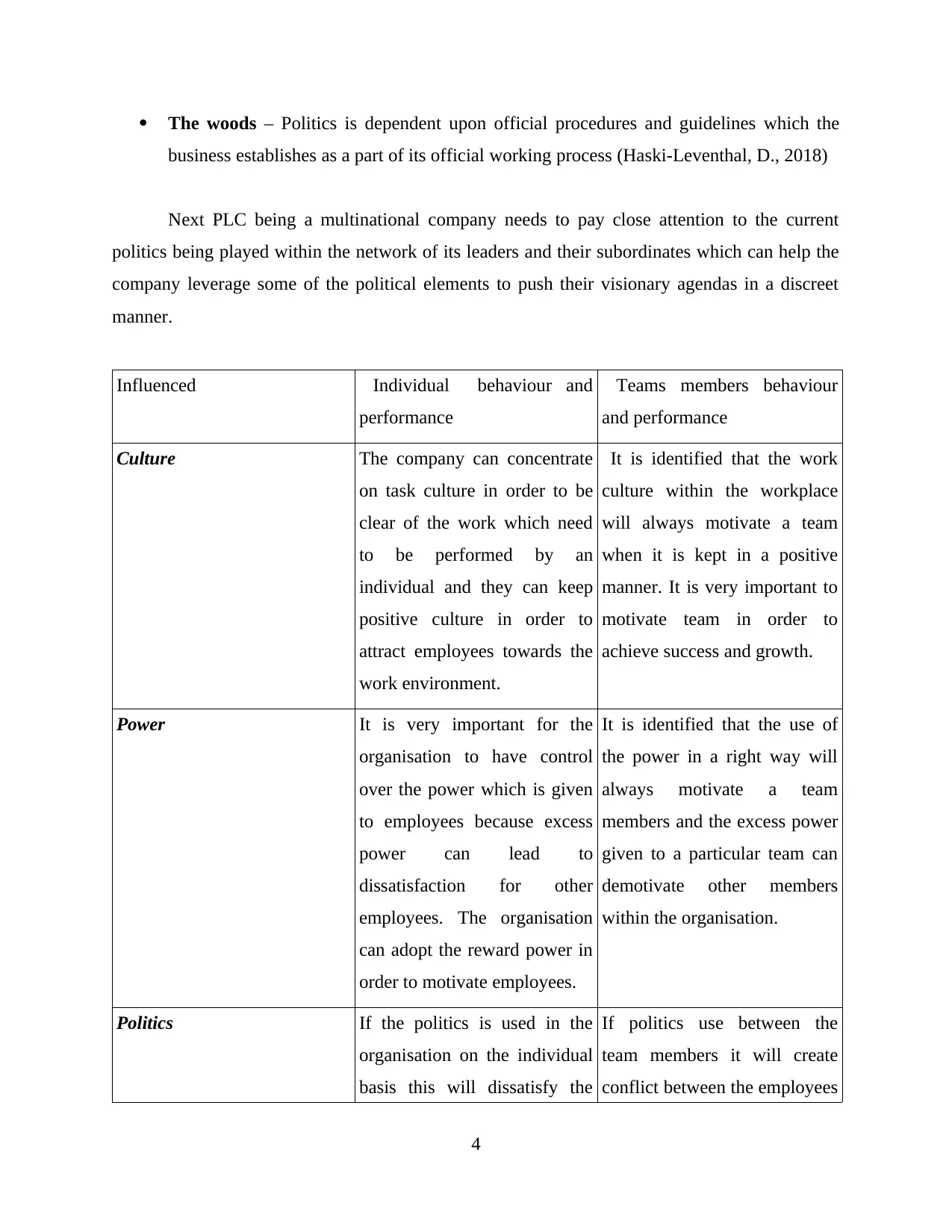
The woods – Politics is dependent upon official procedures and guidelines which the
business establishes as a part of its official working process (Haski-Leventhal, D., 2018)
Next PLC being a multinational company needs to pay close attention to the current
politics being played within the network of its leaders and their subordinates which can help the
company leverage some of the political elements to push their visionary agendas in a discreet
manner.
Influenced Individual behaviour and
performance
Teams members behaviour
and performance
Culture The company can concentrate
on task culture in order to be
clear of the work which need
to be performed by an
individual and they can keep
positive culture in order to
attract employees towards the
work environment.
It is identified that the work
culture within the workplace
will always motivate a team
when it is kept in a positive
manner. It is very important to
motivate team in order to
achieve success and growth.
Power It is very important for the
organisation to have control
over the power which is given
to employees because excess
power can lead to
dissatisfaction for other
employees. The organisation
can adopt the reward power in
order to motivate employees.
It is identified that the use of
the power in a right way will
always motivate a team
members and the excess power
given to a particular team can
demotivate other members
within the organisation.
Politics If the politics is used in the
organisation on the individual
basis this will dissatisfy the
If politics use between the
team members it will create
conflict between the employees
4
business establishes as a part of its official working process (Haski-Leventhal, D., 2018)
Next PLC being a multinational company needs to pay close attention to the current
politics being played within the network of its leaders and their subordinates which can help the
company leverage some of the political elements to push their visionary agendas in a discreet
manner.
Influenced Individual behaviour and
performance
Teams members behaviour
and performance
Culture The company can concentrate
on task culture in order to be
clear of the work which need
to be performed by an
individual and they can keep
positive culture in order to
attract employees towards the
work environment.
It is identified that the work
culture within the workplace
will always motivate a team
when it is kept in a positive
manner. It is very important to
motivate team in order to
achieve success and growth.
Power It is very important for the
organisation to have control
over the power which is given
to employees because excess
power can lead to
dissatisfaction for other
employees. The organisation
can adopt the reward power in
order to motivate employees.
It is identified that the use of
the power in a right way will
always motivate a team
members and the excess power
given to a particular team can
demotivate other members
within the organisation.
Politics If the politics is used in the
organisation on the individual
basis this will dissatisfy the
If politics use between the
team members it will create
conflict between the employees
4
⊘ This is a preview!⊘
Do you want full access?
Subscribe today to unlock all pages.

Trusted by 1+ million students worldwide
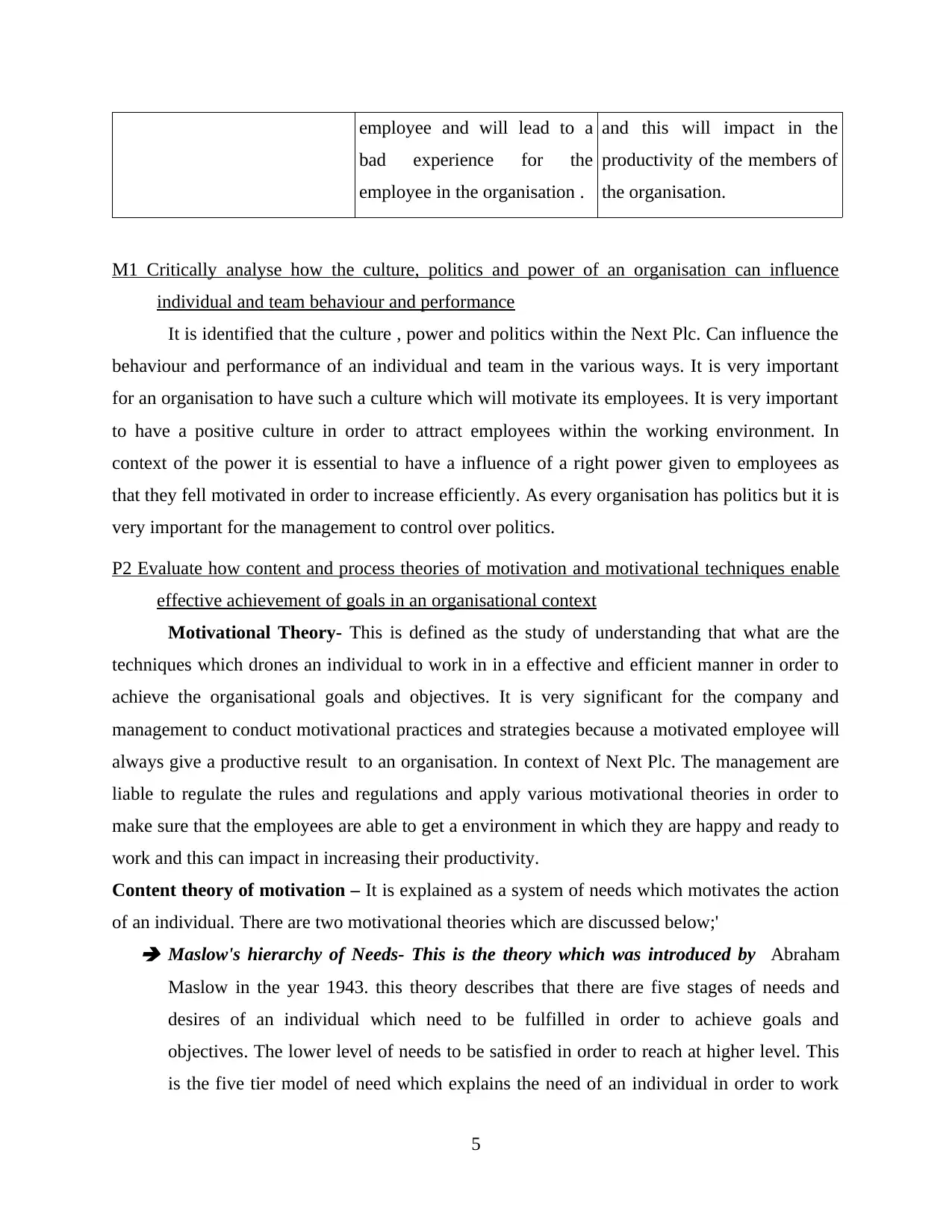
employee and will lead to a
bad experience for the
employee in the organisation .
and this will impact in the
productivity of the members of
the organisation.
M1 Critically analyse how the culture, politics and power of an organisation can influence
individual and team behaviour and performance
It is identified that the culture , power and politics within the Next Plc. Can influence the
behaviour and performance of an individual and team in the various ways. It is very important
for an organisation to have such a culture which will motivate its employees. It is very important
to have a positive culture in order to attract employees within the working environment. In
context of the power it is essential to have a influence of a right power given to employees as
that they fell motivated in order to increase efficiently. As every organisation has politics but it is
very important for the management to control over politics.
P2 Evaluate how content and process theories of motivation and motivational techniques enable
effective achievement of goals in an organisational context
Motivational Theory- This is defined as the study of understanding that what are the
techniques which drones an individual to work in in a effective and efficient manner in order to
achieve the organisational goals and objectives. It is very significant for the company and
management to conduct motivational practices and strategies because a motivated employee will
always give a productive result to an organisation. In context of Next Plc. The management are
liable to regulate the rules and regulations and apply various motivational theories in order to
make sure that the employees are able to get a environment in which they are happy and ready to
work and this can impact in increasing their productivity.
Content theory of motivation – It is explained as a system of needs which motivates the action
of an individual. There are two motivational theories which are discussed below;' Maslow's hierarchy of Needs- This is the theory which was introduced by Abraham
Maslow in the year 1943. this theory describes that there are five stages of needs and
desires of an individual which need to be fulfilled in order to achieve goals and
objectives. The lower level of needs to be satisfied in order to reach at higher level. This
is the five tier model of need which explains the need of an individual in order to work
5
bad experience for the
employee in the organisation .
and this will impact in the
productivity of the members of
the organisation.
M1 Critically analyse how the culture, politics and power of an organisation can influence
individual and team behaviour and performance
It is identified that the culture , power and politics within the Next Plc. Can influence the
behaviour and performance of an individual and team in the various ways. It is very important
for an organisation to have such a culture which will motivate its employees. It is very important
to have a positive culture in order to attract employees within the working environment. In
context of the power it is essential to have a influence of a right power given to employees as
that they fell motivated in order to increase efficiently. As every organisation has politics but it is
very important for the management to control over politics.
P2 Evaluate how content and process theories of motivation and motivational techniques enable
effective achievement of goals in an organisational context
Motivational Theory- This is defined as the study of understanding that what are the
techniques which drones an individual to work in in a effective and efficient manner in order to
achieve the organisational goals and objectives. It is very significant for the company and
management to conduct motivational practices and strategies because a motivated employee will
always give a productive result to an organisation. In context of Next Plc. The management are
liable to regulate the rules and regulations and apply various motivational theories in order to
make sure that the employees are able to get a environment in which they are happy and ready to
work and this can impact in increasing their productivity.
Content theory of motivation – It is explained as a system of needs which motivates the action
of an individual. There are two motivational theories which are discussed below;' Maslow's hierarchy of Needs- This is the theory which was introduced by Abraham
Maslow in the year 1943. this theory describes that there are five stages of needs and
desires of an individual which need to be fulfilled in order to achieve goals and
objectives. The lower level of needs to be satisfied in order to reach at higher level. This
is the five tier model of need which explains the need of an individual in order to work
5
Paraphrase This Document
Need a fresh take? Get an instant paraphrase of this document with our AI Paraphraser
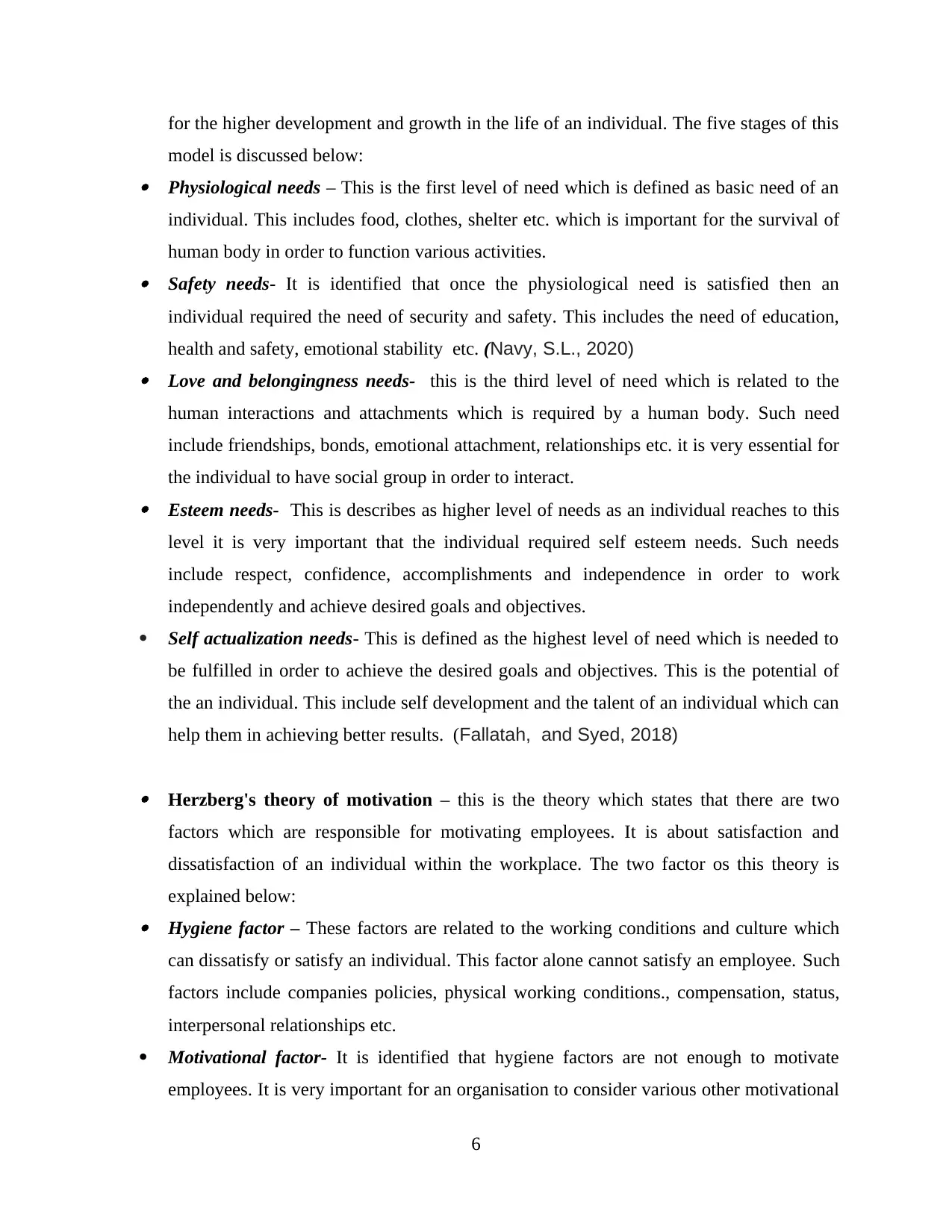
for the higher development and growth in the life of an individual. The five stages of this
model is discussed below: Physiological needs – This is the first level of need which is defined as basic need of an
individual. This includes food, clothes, shelter etc. which is important for the survival of
human body in order to function various activities. Safety needs- It is identified that once the physiological need is satisfied then an
individual required the need of security and safety. This includes the need of education,
health and safety, emotional stability etc. (Navy, S.L., 2020) Love and belongingness needs- this is the third level of need which is related to the
human interactions and attachments which is required by a human body. Such need
include friendships, bonds, emotional attachment, relationships etc. it is very essential for
the individual to have social group in order to interact. Esteem needs- This is describes as higher level of needs as an individual reaches to this
level it is very important that the individual required self esteem needs. Such needs
include respect, confidence, accomplishments and independence in order to work
independently and achieve desired goals and objectives.
Self actualization needs- This is defined as the highest level of need which is needed to
be fulfilled in order to achieve the desired goals and objectives. This is the potential of
the an individual. This include self development and the talent of an individual which can
help them in achieving better results. (Fallatah, and Syed, 2018)
Herzberg's theory of motivation – this is the theory which states that there are two
factors which are responsible for motivating employees. It is about satisfaction and
dissatisfaction of an individual within the workplace. The two factor os this theory is
explained below: Hygiene factor – These factors are related to the working conditions and culture which
can dissatisfy or satisfy an individual. This factor alone cannot satisfy an employee. Such
factors include companies policies, physical working conditions., compensation, status,
interpersonal relationships etc.
Motivational factor- It is identified that hygiene factors are not enough to motivate
employees. It is very important for an organisation to consider various other motivational
6
model is discussed below: Physiological needs – This is the first level of need which is defined as basic need of an
individual. This includes food, clothes, shelter etc. which is important for the survival of
human body in order to function various activities. Safety needs- It is identified that once the physiological need is satisfied then an
individual required the need of security and safety. This includes the need of education,
health and safety, emotional stability etc. (Navy, S.L., 2020) Love and belongingness needs- this is the third level of need which is related to the
human interactions and attachments which is required by a human body. Such need
include friendships, bonds, emotional attachment, relationships etc. it is very essential for
the individual to have social group in order to interact. Esteem needs- This is describes as higher level of needs as an individual reaches to this
level it is very important that the individual required self esteem needs. Such needs
include respect, confidence, accomplishments and independence in order to work
independently and achieve desired goals and objectives.
Self actualization needs- This is defined as the highest level of need which is needed to
be fulfilled in order to achieve the desired goals and objectives. This is the potential of
the an individual. This include self development and the talent of an individual which can
help them in achieving better results. (Fallatah, and Syed, 2018)
Herzberg's theory of motivation – this is the theory which states that there are two
factors which are responsible for motivating employees. It is about satisfaction and
dissatisfaction of an individual within the workplace. The two factor os this theory is
explained below: Hygiene factor – These factors are related to the working conditions and culture which
can dissatisfy or satisfy an individual. This factor alone cannot satisfy an employee. Such
factors include companies policies, physical working conditions., compensation, status,
interpersonal relationships etc.
Motivational factor- It is identified that hygiene factors are not enough to motivate
employees. It is very important for an organisation to consider various other motivational
6
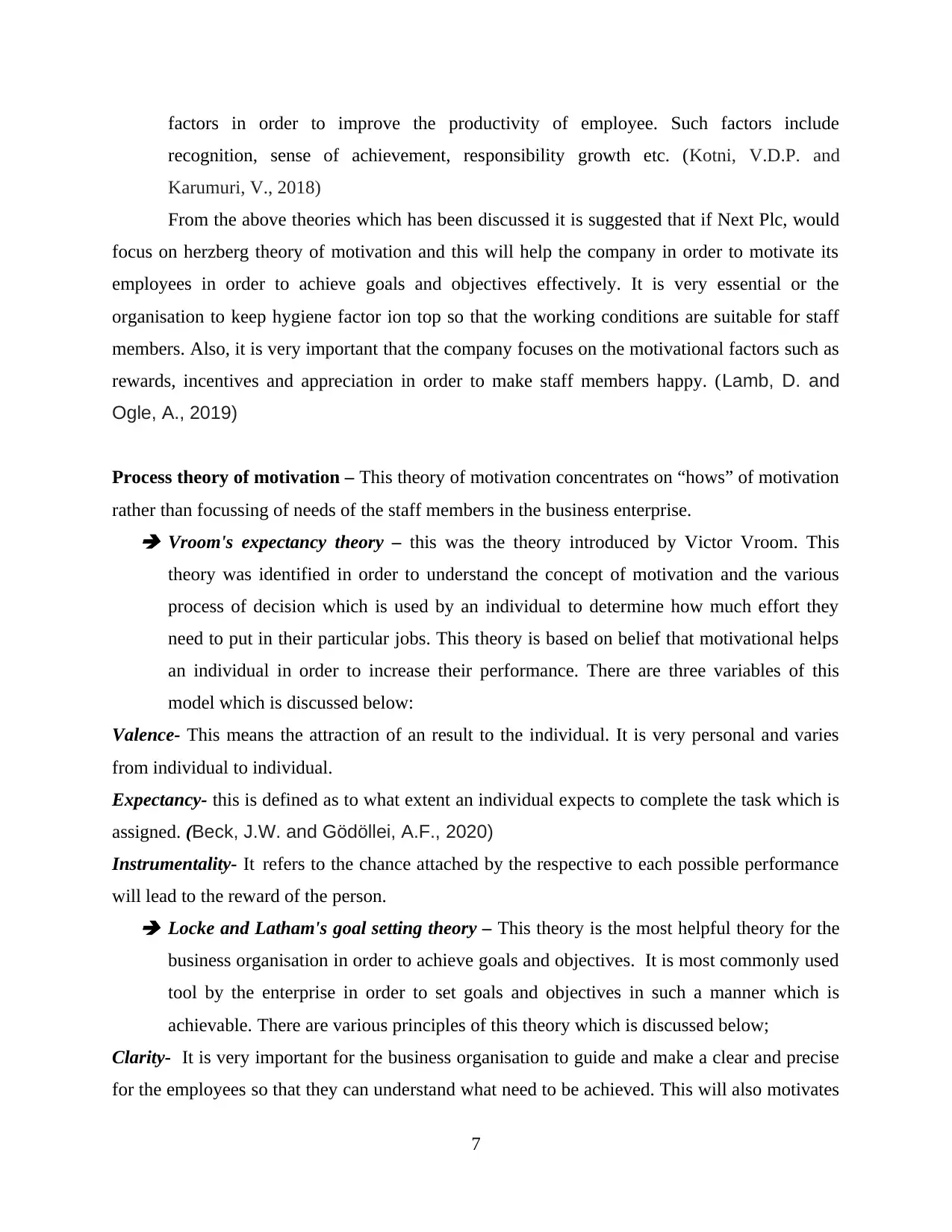
factors in order to improve the productivity of employee. Such factors include
recognition, sense of achievement, responsibility growth etc. (Kotni, V.D.P. and
Karumuri, V., 2018)
From the above theories which has been discussed it is suggested that if Next Plc, would
focus on herzberg theory of motivation and this will help the company in order to motivate its
employees in order to achieve goals and objectives effectively. It is very essential or the
organisation to keep hygiene factor ion top so that the working conditions are suitable for staff
members. Also, it is very important that the company focuses on the motivational factors such as
rewards, incentives and appreciation in order to make staff members happy. (Lamb, D. and
Ogle, A., 2019)
Process theory of motivation – This theory of motivation concentrates on “hows” of motivation
rather than focussing of needs of the staff members in the business enterprise. Vroom's expectancy theory – this was the theory introduced by Victor Vroom. This
theory was identified in order to understand the concept of motivation and the various
process of decision which is used by an individual to determine how much effort they
need to put in their particular jobs. This theory is based on belief that motivational helps
an individual in order to increase their performance. There are three variables of this
model which is discussed below:
Valence- This means the attraction of an result to the individual. It is very personal and varies
from individual to individual.
Expectancy- this is defined as to what extent an individual expects to complete the task which is
assigned. (Beck, J.W. and Gödöllei, A.F., 2020)
Instrumentality- It refers to the chance attached by the respective to each possible performance
will lead to the reward of the person. Locke and Latham's goal setting theory – This theory is the most helpful theory for the
business organisation in order to achieve goals and objectives. It is most commonly used
tool by the enterprise in order to set goals and objectives in such a manner which is
achievable. There are various principles of this theory which is discussed below;
Clarity- It is very important for the business organisation to guide and make a clear and precise
for the employees so that they can understand what need to be achieved. This will also motivates
7
recognition, sense of achievement, responsibility growth etc. (Kotni, V.D.P. and
Karumuri, V., 2018)
From the above theories which has been discussed it is suggested that if Next Plc, would
focus on herzberg theory of motivation and this will help the company in order to motivate its
employees in order to achieve goals and objectives effectively. It is very essential or the
organisation to keep hygiene factor ion top so that the working conditions are suitable for staff
members. Also, it is very important that the company focuses on the motivational factors such as
rewards, incentives and appreciation in order to make staff members happy. (Lamb, D. and
Ogle, A., 2019)
Process theory of motivation – This theory of motivation concentrates on “hows” of motivation
rather than focussing of needs of the staff members in the business enterprise. Vroom's expectancy theory – this was the theory introduced by Victor Vroom. This
theory was identified in order to understand the concept of motivation and the various
process of decision which is used by an individual to determine how much effort they
need to put in their particular jobs. This theory is based on belief that motivational helps
an individual in order to increase their performance. There are three variables of this
model which is discussed below:
Valence- This means the attraction of an result to the individual. It is very personal and varies
from individual to individual.
Expectancy- this is defined as to what extent an individual expects to complete the task which is
assigned. (Beck, J.W. and Gödöllei, A.F., 2020)
Instrumentality- It refers to the chance attached by the respective to each possible performance
will lead to the reward of the person. Locke and Latham's goal setting theory – This theory is the most helpful theory for the
business organisation in order to achieve goals and objectives. It is most commonly used
tool by the enterprise in order to set goals and objectives in such a manner which is
achievable. There are various principles of this theory which is discussed below;
Clarity- It is very important for the business organisation to guide and make a clear and precise
for the employees so that they can understand what need to be achieved. This will also motivates
7
⊘ This is a preview!⊘
Do you want full access?
Subscribe today to unlock all pages.

Trusted by 1+ million students worldwide
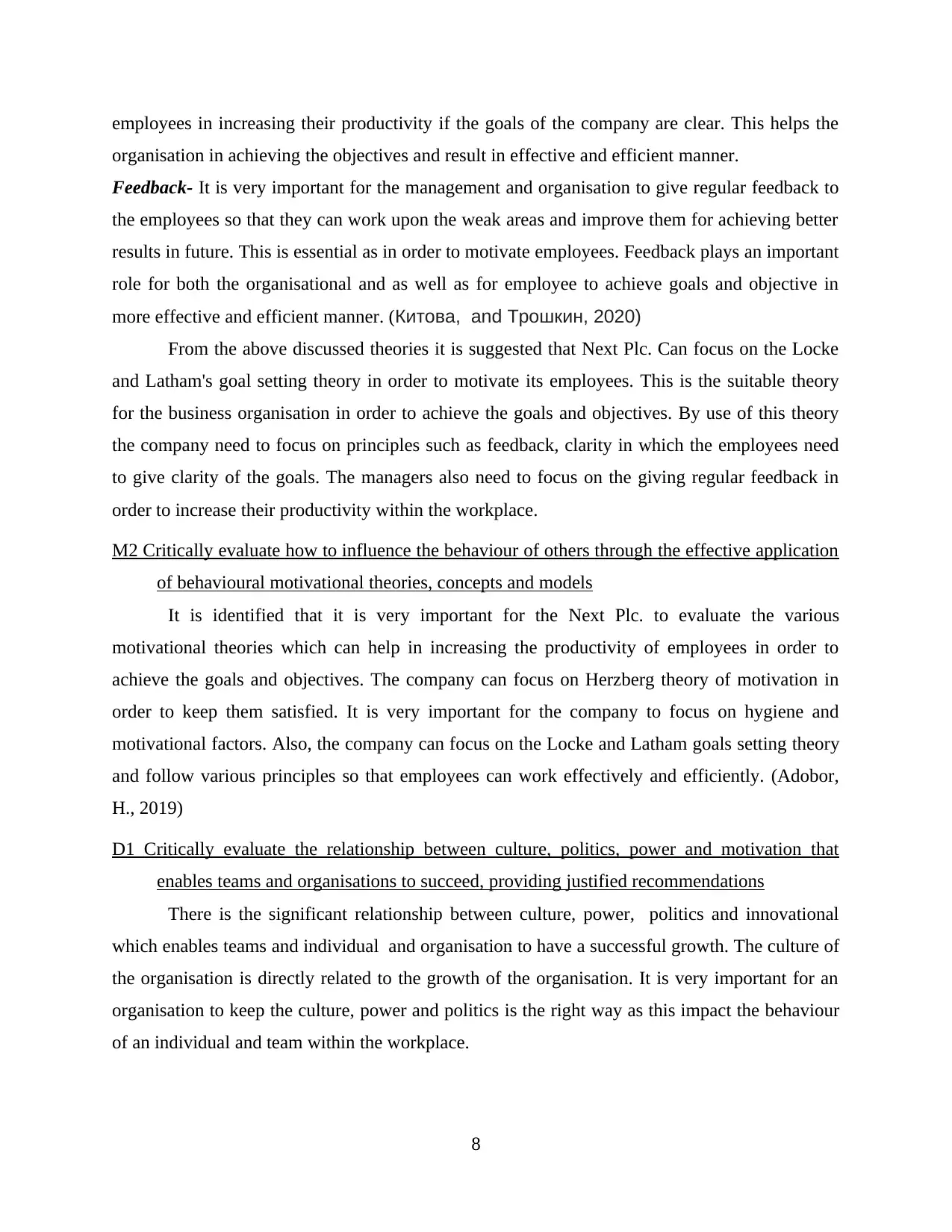
employees in increasing their productivity if the goals of the company are clear. This helps the
organisation in achieving the objectives and result in effective and efficient manner.
Feedback- It is very important for the management and organisation to give regular feedback to
the employees so that they can work upon the weak areas and improve them for achieving better
results in future. This is essential as in order to motivate employees. Feedback plays an important
role for both the organisational and as well as for employee to achieve goals and objective in
more effective and efficient manner. (Китова, and Трошкин, 2020)
From the above discussed theories it is suggested that Next Plc. Can focus on the Locke
and Latham's goal setting theory in order to motivate its employees. This is the suitable theory
for the business organisation in order to achieve the goals and objectives. By use of this theory
the company need to focus on principles such as feedback, clarity in which the employees need
to give clarity of the goals. The managers also need to focus on the giving regular feedback in
order to increase their productivity within the workplace.
M2 Critically evaluate how to influence the behaviour of others through the effective application
of behavioural motivational theories, concepts and models
It is identified that it is very important for the Next Plc. to evaluate the various
motivational theories which can help in increasing the productivity of employees in order to
achieve the goals and objectives. The company can focus on Herzberg theory of motivation in
order to keep them satisfied. It is very important for the company to focus on hygiene and
motivational factors. Also, the company can focus on the Locke and Latham goals setting theory
and follow various principles so that employees can work effectively and efficiently. (Adobor,
H., 2019)
D1 Critically evaluate the relationship between culture, politics, power and motivation that
enables teams and organisations to succeed, providing justified recommendations
There is the significant relationship between culture, power, politics and innovational
which enables teams and individual and organisation to have a successful growth. The culture of
the organisation is directly related to the growth of the organisation. It is very important for an
organisation to keep the culture, power and politics is the right way as this impact the behaviour
of an individual and team within the workplace.
8
organisation in achieving the objectives and result in effective and efficient manner.
Feedback- It is very important for the management and organisation to give regular feedback to
the employees so that they can work upon the weak areas and improve them for achieving better
results in future. This is essential as in order to motivate employees. Feedback plays an important
role for both the organisational and as well as for employee to achieve goals and objective in
more effective and efficient manner. (Китова, and Трошкин, 2020)
From the above discussed theories it is suggested that Next Plc. Can focus on the Locke
and Latham's goal setting theory in order to motivate its employees. This is the suitable theory
for the business organisation in order to achieve the goals and objectives. By use of this theory
the company need to focus on principles such as feedback, clarity in which the employees need
to give clarity of the goals. The managers also need to focus on the giving regular feedback in
order to increase their productivity within the workplace.
M2 Critically evaluate how to influence the behaviour of others through the effective application
of behavioural motivational theories, concepts and models
It is identified that it is very important for the Next Plc. to evaluate the various
motivational theories which can help in increasing the productivity of employees in order to
achieve the goals and objectives. The company can focus on Herzberg theory of motivation in
order to keep them satisfied. It is very important for the company to focus on hygiene and
motivational factors. Also, the company can focus on the Locke and Latham goals setting theory
and follow various principles so that employees can work effectively and efficiently. (Adobor,
H., 2019)
D1 Critically evaluate the relationship between culture, politics, power and motivation that
enables teams and organisations to succeed, providing justified recommendations
There is the significant relationship between culture, power, politics and innovational
which enables teams and individual and organisation to have a successful growth. The culture of
the organisation is directly related to the growth of the organisation. It is very important for an
organisation to keep the culture, power and politics is the right way as this impact the behaviour
of an individual and team within the workplace.
8
Paraphrase This Document
Need a fresh take? Get an instant paraphrase of this document with our AI Paraphraser
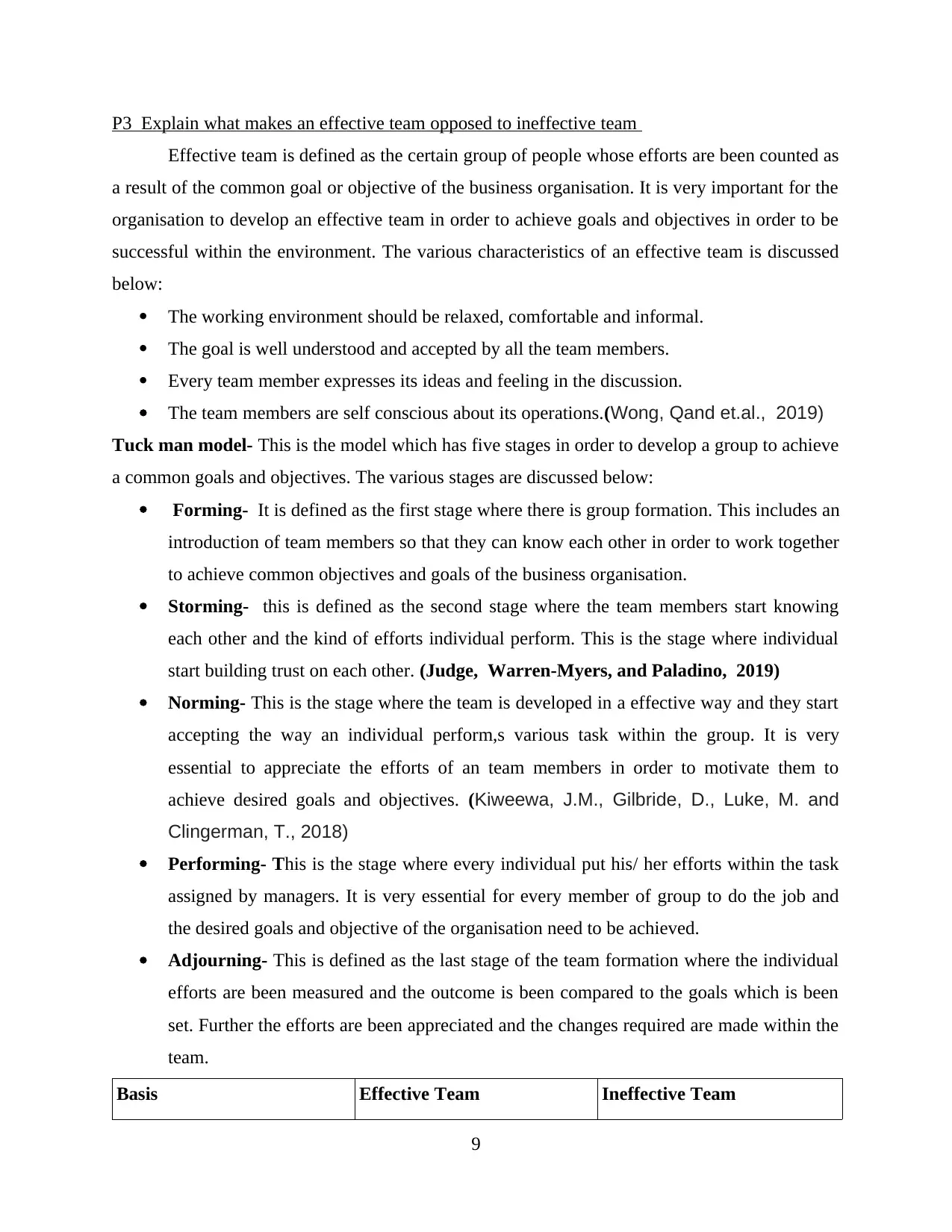
P3 Explain what makes an effective team opposed to ineffective team
Effective team is defined as the certain group of people whose efforts are been counted as
a result of the common goal or objective of the business organisation. It is very important for the
organisation to develop an effective team in order to achieve goals and objectives in order to be
successful within the environment. The various characteristics of an effective team is discussed
below:
The working environment should be relaxed, comfortable and informal.
The goal is well understood and accepted by all the team members.
Every team member expresses its ideas and feeling in the discussion.
The team members are self conscious about its operations.(Wong, Qand et.al., 2019)
Tuck man model- This is the model which has five stages in order to develop a group to achieve
a common goals and objectives. The various stages are discussed below:
Forming- It is defined as the first stage where there is group formation. This includes an
introduction of team members so that they can know each other in order to work together
to achieve common objectives and goals of the business organisation.
Storming- this is defined as the second stage where the team members start knowing
each other and the kind of efforts individual perform. This is the stage where individual
start building trust on each other. (Judge, Warren-Myers, and Paladino, 2019)
Norming- This is the stage where the team is developed in a effective way and they start
accepting the way an individual perform,s various task within the group. It is very
essential to appreciate the efforts of an team members in order to motivate them to
achieve desired goals and objectives. (Kiweewa, J.M., Gilbride, D., Luke, M. and
Clingerman, T., 2018)
Performing- This is the stage where every individual put his/ her efforts within the task
assigned by managers. It is very essential for every member of group to do the job and
the desired goals and objective of the organisation need to be achieved.
Adjourning- This is defined as the last stage of the team formation where the individual
efforts are been measured and the outcome is been compared to the goals which is been
set. Further the efforts are been appreciated and the changes required are made within the
team.
Basis Effective Team Ineffective Team
9
Effective team is defined as the certain group of people whose efforts are been counted as
a result of the common goal or objective of the business organisation. It is very important for the
organisation to develop an effective team in order to achieve goals and objectives in order to be
successful within the environment. The various characteristics of an effective team is discussed
below:
The working environment should be relaxed, comfortable and informal.
The goal is well understood and accepted by all the team members.
Every team member expresses its ideas and feeling in the discussion.
The team members are self conscious about its operations.(Wong, Qand et.al., 2019)
Tuck man model- This is the model which has five stages in order to develop a group to achieve
a common goals and objectives. The various stages are discussed below:
Forming- It is defined as the first stage where there is group formation. This includes an
introduction of team members so that they can know each other in order to work together
to achieve common objectives and goals of the business organisation.
Storming- this is defined as the second stage where the team members start knowing
each other and the kind of efforts individual perform. This is the stage where individual
start building trust on each other. (Judge, Warren-Myers, and Paladino, 2019)
Norming- This is the stage where the team is developed in a effective way and they start
accepting the way an individual perform,s various task within the group. It is very
essential to appreciate the efforts of an team members in order to motivate them to
achieve desired goals and objectives. (Kiweewa, J.M., Gilbride, D., Luke, M. and
Clingerman, T., 2018)
Performing- This is the stage where every individual put his/ her efforts within the task
assigned by managers. It is very essential for every member of group to do the job and
the desired goals and objective of the organisation need to be achieved.
Adjourning- This is defined as the last stage of the team formation where the individual
efforts are been measured and the outcome is been compared to the goals which is been
set. Further the efforts are been appreciated and the changes required are made within the
team.
Basis Effective Team Ineffective Team
9
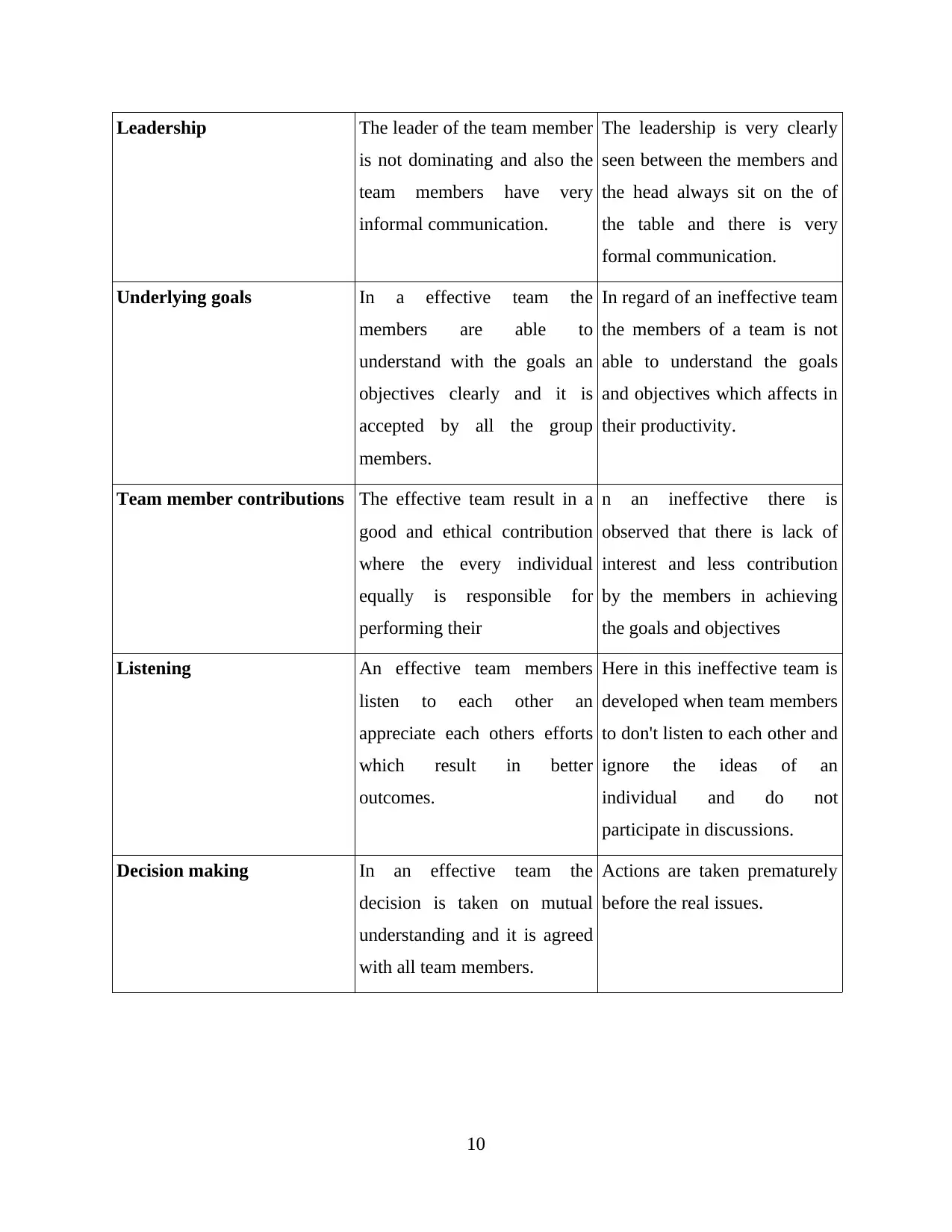
Leadership The leader of the team member
is not dominating and also the
team members have very
informal communication.
The leadership is very clearly
seen between the members and
the head always sit on the of
the table and there is very
formal communication.
Underlying goals In a effective team the
members are able to
understand with the goals an
objectives clearly and it is
accepted by all the group
members.
In regard of an ineffective team
the members of a team is not
able to understand the goals
and objectives which affects in
their productivity.
Team member contributions The effective team result in a
good and ethical contribution
where the every individual
equally is responsible for
performing their
n an ineffective there is
observed that there is lack of
interest and less contribution
by the members in achieving
the goals and objectives
Listening An effective team members
listen to each other an
appreciate each others efforts
which result in better
outcomes.
Here in this ineffective team is
developed when team members
to don't listen to each other and
ignore the ideas of an
individual and do not
participate in discussions.
Decision making In an effective team the
decision is taken on mutual
understanding and it is agreed
with all team members.
Actions are taken prematurely
before the real issues.
10
is not dominating and also the
team members have very
informal communication.
The leadership is very clearly
seen between the members and
the head always sit on the of
the table and there is very
formal communication.
Underlying goals In a effective team the
members are able to
understand with the goals an
objectives clearly and it is
accepted by all the group
members.
In regard of an ineffective team
the members of a team is not
able to understand the goals
and objectives which affects in
their productivity.
Team member contributions The effective team result in a
good and ethical contribution
where the every individual
equally is responsible for
performing their
n an ineffective there is
observed that there is lack of
interest and less contribution
by the members in achieving
the goals and objectives
Listening An effective team members
listen to each other an
appreciate each others efforts
which result in better
outcomes.
Here in this ineffective team is
developed when team members
to don't listen to each other and
ignore the ideas of an
individual and do not
participate in discussions.
Decision making In an effective team the
decision is taken on mutual
understanding and it is agreed
with all team members.
Actions are taken prematurely
before the real issues.
10
⊘ This is a preview!⊘
Do you want full access?
Subscribe today to unlock all pages.

Trusted by 1+ million students worldwide
1 out of 17
Related Documents
Your All-in-One AI-Powered Toolkit for Academic Success.
+13062052269
info@desklib.com
Available 24*7 on WhatsApp / Email
![[object Object]](/_next/static/media/star-bottom.7253800d.svg)
Unlock your academic potential
Copyright © 2020–2026 A2Z Services. All Rights Reserved. Developed and managed by ZUCOL.



